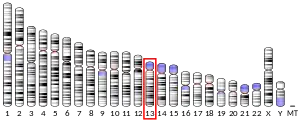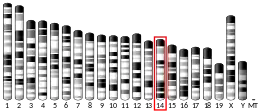| KLF12 | |||||||||||||||||||||||||||||||||||||||||||||||||||
|---|---|---|---|---|---|---|---|---|---|---|---|---|---|---|---|---|---|---|---|---|---|---|---|---|---|---|---|---|---|---|---|---|---|---|---|---|---|---|---|---|---|---|---|---|---|---|---|---|---|---|---|
| Identifiers | |||||||||||||||||||||||||||||||||||||||||||||||||||
| Aliases | KLF12, AP-2rep, AP2REP, HSPC122, Kruppel-like factor 12, Kruppel like factor 12 | ||||||||||||||||||||||||||||||||||||||||||||||||||
| External IDs | OMIM: 607531 MGI: 1333796 HomoloGene: 21417 GeneCards: KLF12 | ||||||||||||||||||||||||||||||||||||||||||||||||||
| |||||||||||||||||||||||||||||||||||||||||||||||||||
| |||||||||||||||||||||||||||||||||||||||||||||||||||
| |||||||||||||||||||||||||||||||||||||||||||||||||||
| |||||||||||||||||||||||||||||||||||||||||||||||||||
| Wikidata | |||||||||||||||||||||||||||||||||||||||||||||||||||
| |||||||||||||||||||||||||||||||||||||||||||||||||||
Krueppel-like factor 12 is a protein that in humans is encoded by the KLF12 gene.[5][6]
Activator protein-2 alpha (AP-2 alpha) is a developmentally-regulated transcription factor and important regulator of gene expression during vertebrate development and carcinogenesis. The protein encoded by this gene is a member of the Kruppel-like zinc finger protein family and can repress expression of the AP-2 alpha gene by binding to a specific site in the AP-2 alpha gene promoter. Repression by the encoded protein requires binding with a corepressor, CtBP1. Two transcript variants encoding different isoforms have been found for this gene.[6]
See also
References
- 1 2 3 GRCh38: Ensembl release 89: ENSG00000118922 - Ensembl, May 2017
- 1 2 3 GRCm38: Ensembl release 89: ENSMUSG00000072294 - Ensembl, May 2017
- ↑ "Human PubMed Reference:". National Center for Biotechnology Information, U.S. National Library of Medicine.
- ↑ "Mouse PubMed Reference:". National Center for Biotechnology Information, U.S. National Library of Medicine.
- ↑ Roth C, Schuierer M, Gunther K, Buettner R (Jul 2000). "Genomic structure and DNA binding properties of the human zinc finger transcriptional repressor AP-2rep (KLF12)". Genomics. 63 (3): 384–90. doi:10.1006/geno.1999.6084. PMID 10704285.
- 1 2 "Entrez Gene: KLF12 Kruppel-like factor 12".
Further reading
- Imhof A, Schuierer M, Werner O, et al. (1999). "Transcriptional regulation of the AP-2alpha promoter by BTEB-1 and AP-2rep, a novel wt-1/egr-related zinc finger repressor". Mol. Cell. Biol. 19 (1): 194–204. doi:10.1128/MCB.19.1.194. PMC 83878. PMID 9858544.
- Zhang QH, Ye M, Wu XY, et al. (2001). "Cloning and functional analysis of cDNAs with open reading frames for 300 previously undefined genes expressed in CD34+ hematopoietic stem/progenitor cells". Genome Res. 10 (10): 1546–60. doi:10.1101/gr.140200. PMC 310934. PMID 11042152.
- Schuierer M, Hilger-Eversheim K, Dobner T, et al. (2001). "Induction of AP-2alpha expression by adenoviral infection involves inactivation of the AP-2rep transcriptional corepressor CtBP1". J. Biol. Chem. 276 (30): 27944–9. doi:10.1074/jbc.M100070200. PMID 11373277.
- Zhu CH, Huang Y, Broman MT, Domann FE (2001). "Expression of AP-2 alpha in SV40 immortalized human lung fibroblasts is associated with a distinct pattern of cytosine methylation in the AP-2 alpha promoter". Biochim. Biophys. Acta. 1519 (1–2): 85–91. doi:10.1016/s0167-4781(01)00227-5. PMID 11406275.
- Chen C, Brabham WW, Stultz BG, et al. (2001). "Defining a common region of deletion at 13q21 in human cancers". Genes Chromosomes Cancer. 31 (4): 333–44. doi:10.1002/gcc.1152. PMID 11433524. S2CID 42200056.
- Rozenblum E, Vahteristo P, Sandberg T, et al. (2002). "A genomic map of a 6-Mb region at 13q21-q22 implicated in cancer development: identification and characterization of candidate genes". Hum. Genet. 110 (2): 111–21. doi:10.1007/s00439-001-0646-6. PMID 11935316. S2CID 21371347.
- Strausberg RL, Feingold EA, Grouse LH, et al. (2003). "Generation and initial analysis of more than 15,000 full-length human and mouse cDNA sequences". Proc. Natl. Acad. Sci. U.S.A. 99 (26): 16899–903. Bibcode:2002PNAS...9916899M. doi:10.1073/pnas.242603899. PMC 139241. PMID 12477932.
- Ota T, Suzuki Y, Nishikawa T, et al. (2004). "Complete sequencing and characterization of 21,243 full-length human cDNAs". Nat. Genet. 36 (1): 40–5. doi:10.1038/ng1285. PMID 14702039.
- Dunham A, Matthews LH, Burton J, et al. (2004). "The DNA sequence and analysis of human chromosome 13". Nature. 428 (6982): 522–8. Bibcode:2004Natur.428..522D. doi:10.1038/nature02379. PMC 2665288. PMID 15057823.
- Gerhard DS, Wagner L, Feingold EA, et al. (2004). "The status, quality, and expansion of the NIH full-length cDNA project: the Mammalian Gene Collection (MGC)". Genome Res. 14 (10B): 2121–7. doi:10.1101/gr.2596504. PMC 528928. PMID 15489334.
- Rual JF, Venkatesan K, Hao T, et al. (2005). "Towards a proteome-scale map of the human protein-protein interaction network". Nature. 437 (7062): 1173–8. Bibcode:2005Natur.437.1173R. doi:10.1038/nature04209. PMID 16189514. S2CID 4427026.
- Kimura K, Wakamatsu A, Suzuki Y, et al. (2006). "Diversification of transcriptional modulation: large-scale identification and characterization of putative alternative promoters of human genes". Genome Res. 16 (1): 55–65. doi:10.1101/gr.4039406. PMC 1356129. PMID 16344560.
- Suda S, Rai T, Sohara E, et al. (2006). "Postnatal expression of KLF12 in the inner medullary collecting ducts of kidney and its trans-activation of UT-A1 urea transporter promoter". Biochem. Biophys. Res. Commun. 344 (1): 246–52. doi:10.1016/j.bbrc.2006.03.138. PMID 16615998.
External links
- KLF12+protein,+human at the U.S. National Library of Medicine Medical Subject Headings (MeSH)
This article incorporates text from the United States National Library of Medicine, which is in the public domain.






